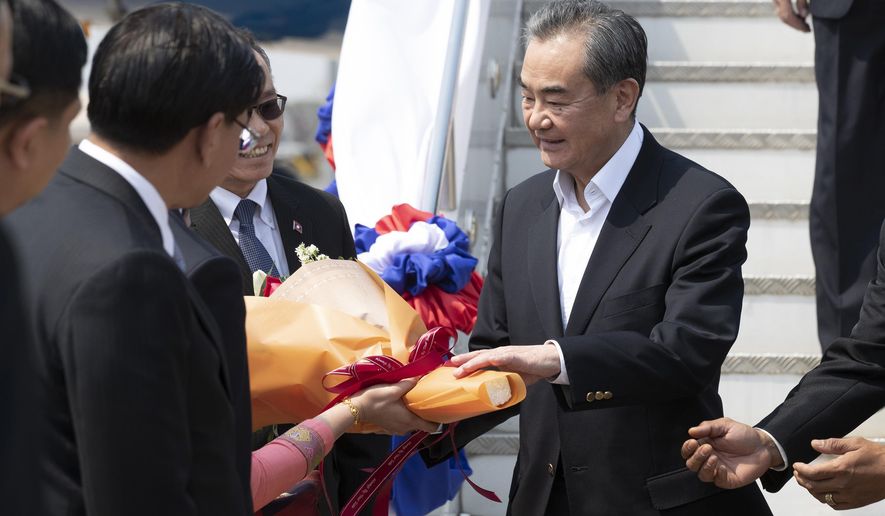VIENTIANE, Laos (AP) - China’s top diplomat assured his Southeast Asian counterparts on Wednesday that the situation in a central Chinese province where the outbreak of a new virus began has “been brought under effective control.”
Foreign Minister Wang Yi also expressed confidence that China can “secure an early victory against this outbreak.”
Wang made the remarks in a speech to diplomats from the Association of Southeast Asian Nations in the Laotian capital of Vientiane. The group, which has expressed alarm over the outbreak that started in China’s Hubei province, is to hold an emergency meeting on Thursday to discuss the disease.
Six countries in the 10-nation ASEAN bloc have confirmed cases of the virus.
“With the strong efforts of the Chinese nation, the entire situation is turning for the better,” Wang said. “Hubei province and Wuhan city have been at the epicenter of this outbreak and the situation in these places has been brought under effective control.”
Outside Hubei, the number of confirmed cases has dropped for 15 consecutive days and the number of cured and discharged patients is also rising, Wang said, adding that on Tuesday, the number of cured patients was larger than the number of new infections for the first time since the outbreak began in December.
Asked to comment on Wang’s assurances, Thai Foreign Minister Don Pramudwinai said China managed to stop an outbreak of SARS, a related virus, years ago. “I hope that the Chinese could do the same thing this time,” he told The Associated Press.
U.N. Secretary General Antonio Guterres told the AP on Tuesday that the virus “is not out of control but it is a very dangerous situation.” He added that “the risks are enormous and we need to be prepared worldwide for that.”
Wang’s reassurance came after ASEAN leaders expressed “serious concerns over the outbreak” in a joint statement this week. They said it “poses severe challenges to the well-being of the peoples and the development of our respective countries and the region and the world.”
More than 75,000 people have been infected globally, with more than 2,000 deaths, mostly in China.
China and Southeast Asia could face greater economic losses if travel restrictions and other actions taken to prevent the spread of the virus drag on.
The ASEAN leaders agreed to increase the timely sharing of information within the bloc and with China and the World Health Organization. They underscored “the need to coordinate and standardize measures to ensure proper health inspection at borders and entry points of ASEAN member states.”
Alarm over the contagion has prompted Malaysia to bar the transit of cruise ship passengers after an American woman from the MS Westerdam tested positive for the virus.
She was among 145 passengers who flew from Cambodia to Malaysia on Friday. The Westerdam was turned away from four Asian ports before Cambodia allowed it to dock in Sihanoukville.
Other contacts between China and ASEAN have been affected by the outbreak.
A meeting of Chinese and ASEAN diplomats negotiating a regional “code of conduct” to prevent clashes in the disputed South China Sea was postponed in Brunei early this month, according to two Southeast Asian diplomats.
China was to host a meeting with four ASEAN members located along the Mekong River but moved the talks to Laos this week due to the outbreak and sought a separate meeting with all its member states to discuss the epidemic, the two diplomats said. They spoke on condition of anonymity because they weren’t authorized to provide information to the media.
Laos has not reported any infections, along with Indonesia, Brunei and Myanmar. The rest of ASEAN, including Singapore, Thailand, Malaysia, Vietnam, the Philippines and Cambodia, have varying numbers of cases.
The first fatality outside mainland China was in the Philippines.




Please read our comment policy before commenting.